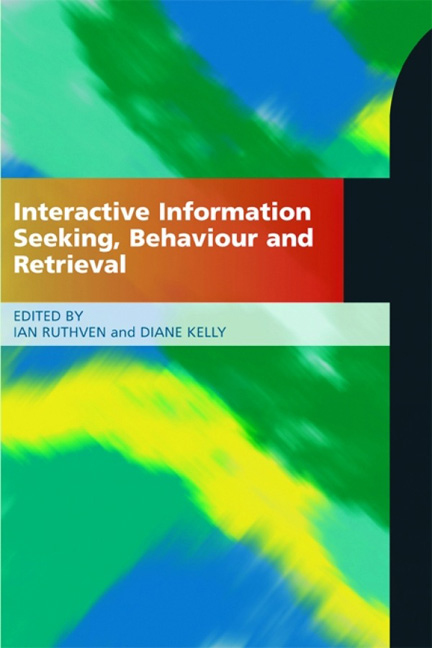Book contents
- Frontmatter
- Dedication
- Contents
- Figures and tables: acknowledgements
- Contributors
- Foreword
- Preface
- 1 Interactive information retrieval: history and background
- 2 Information behavior and seeking
- 3 Task-based information searching and retrieval
- 4 Approaches to investigating information interaction and behaviour
- 5 Information representation
- 6 Access models
- 7 Evaluation
- 8 Interfaces for information retrieval
- 9 Interactive techniques
- 10 Web retrieval, ranking and personalization
- 11 Recommendation, collaboration and social search
- 12 Multimedia: behaviour, interfaces and interaction
- 13 Multimedia: information representation and access
- References
- Index
9 - Interactive techniques
Published online by Cambridge University Press: 08 June 2018
- Frontmatter
- Dedication
- Contents
- Figures and tables: acknowledgements
- Contributors
- Foreword
- Preface
- 1 Interactive information retrieval: history and background
- 2 Information behavior and seeking
- 3 Task-based information searching and retrieval
- 4 Approaches to investigating information interaction and behaviour
- 5 Information representation
- 6 Access models
- 7 Evaluation
- 8 Interfaces for information retrieval
- 9 Interactive techniques
- 10 Web retrieval, ranking and personalization
- 11 Recommendation, collaboration and social search
- 12 Multimedia: behaviour, interfaces and interaction
- 13 Multimedia: information representation and access
- References
- Index
Summary
Introduction
Information seeking is a core human life activity, driven by information needs, which are situation-driven phenomena emerging from people's desire to tackle a problem (Belkin, Oddy and Brooks, 1982a, 1982b) or address an incompleteness (Mackay, 1960; Belkin, 1980; Dervin, 1983). Search systems provide a means for people to find the information they seek rapidly. Interaction between searchers and these systems is important for effective information retrieval, whose interaction is primarily manifested in mainstream search systems, such as web search engines, through multi-turn queries comprising dialogue (input by the user) and search results (output by the system). Query formulation can be an intellectually demanding process that has a direct impact on the relevancy of search results (Croft and Thompson, 1987). When searchers are unfamiliar with the collection makeup and retrieval environment or information needs are vague or complex, query formulation challenges are magnified (Furnas et al., 1987; Salton and Buckley, 1990; Spink, Greisdorf and Bateman, 1998). To help users, search systems can provide support beyond processing rudimentary queries and providing search results. Systems can help their users determine the relevant items, create effective search queries, and make search decisions such as determining how best to use the query. Among other benefits, these techniques can help searchers better specify well defined information needs or further develop their previously ill-defined needs. In this chapter we describe techniques that have emerged from the information retrieval research community in recent decades to support search interaction. We begin with a brief description of how interaction is traditionally modeled in information-seeking research.
Modeling information seeking
Information retrieval traditionally conforms to a query-centric model of information seeking known as specified searching, where the query conceived by a searcher and presented to the system is assumed to specify the information that the searcher is trying to locate (Oddy, 1977). This model assumes that the information being sought exists in the document collection being searched and that the goal of the search process is to retrieve that information. Although this paradigm permits query refinement, information-seeking behavior is constrained to analytical search strategies that yield precise results with minimal need for result set examination and item comparison (Marchionini, 2006b). Such information-seeking scenarios would benefit from support for lookup searches and other specialized search support.
- Type
- Chapter
- Information
- Interactive Information Seeking, Behaviour and Retrieval , pp. 171 - 188Publisher: FacetPrint publication year: 2011
- 1
- Cited by



